Dorothea Shefer-Vanson's Blog, page 5
November 6, 2024
Mending Broken Soldiers
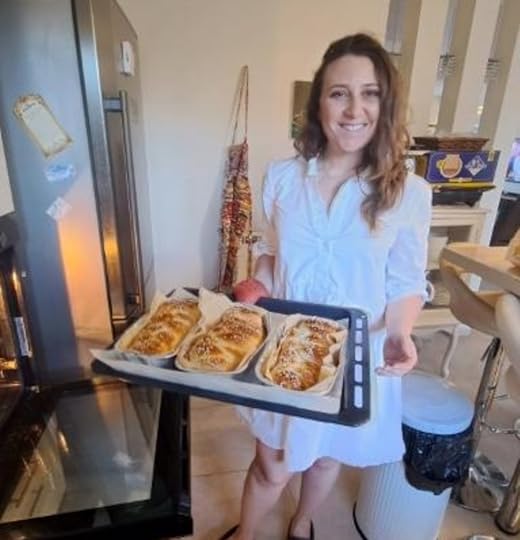
The war that Israel has been waging for the past year, first in Gaza and now also in Lebanon, has taken a heavy toll. Almost eight hundred Israeli soldiers have been killed and over ten thousand wounded, many of them seriously. The task of rehabilitating the injured soldiers falls on Israel’s hospitals, many of which have specialized units allied to the Ministry of Defence which are devoted to repairing injured bodies, teaching amputees to cope with their new situation, and providing physical and psychological therapy to enable the soldiers to resume some semblance of normal life.
In several cases only the devoted ministrations of medics and comrades in the field, followed by rapid evacuation by helicopter, has served to save the lives of soldiers who have been shot or injured, wounded by shrapnel or trapped under rubble when an explosive device caused a three-storey house to collapse on them. The resulting injuries require many long hours on the operating table, followed by extensive nurture and care to give the injured person a chance of recovery, however partial.
Many Israelis, whether as individuals, in groups or associations, have taken it upon themselves to provide ‘extra-curricular’ help to the wounded soldiers, visiting them in hospital, bringing them food or special treats, and generally doing what they can to improve the morale of sturdy young men who suddenly find themselves in a situation of near-helplessness.
One such noble soul happens to be my granddaughter Shir who, after completing her university studies, now lives and works in digital advertising in Tel Aviv. In the last few years she has made a habit of baking Challot (plaited loaves) and cakes every week, distributing them to friends and family, and also taking them to the Sheba Hospital in Tel Aviv, where she makes straight for the ward where the injured soldiers are situated.
Each cake is neatly wrapped in cellophane and decorated with flowers and ribbons, providing a combination of aesthetic pleasure and culinary delight to the recipients. Shir, who happens to be a beautiful young woman, also sits at the bedside of several soldiers, talking to them and encouraging them. I’m sure she does a lot to raise their morale. Last week she told me with a sense of pride that two of the soldiers she has been visiting have been released from hospital, to continue their rehabilitation in a separate unit devoted to providing the treatment the young men require. She is sad to see them go, but glad that they are on their way to a full recovery.
The cost to Israel in the loss of life and the physical and mental damage is incalculable. I can only hope that sense will prevail and the war be brought to an end in the near future.
October 30, 2024
A Question of Values
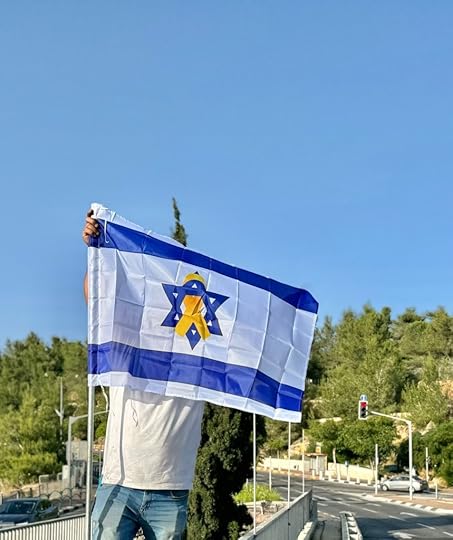
It may not be fair to hark back to Israel’s Declaration of Independence, which dates from 1948, in judging modern-day Israel. Nevertheless, the inclination remains. When Israel’s founding principles were delineated, in the aftermath of the Second World War and the Holocaust, the national entity (Yishuv) had already existed for almost one hundred years, based on the ingathering of the exiles, the establishment of a fair and free society, Jewish agriculture and labour as well as egalitarian, liberal principles. All these concepts were outlined in the Declaration of Independence which assumed the status of a founding constitution, resting on “foundations of liberty, justice and peace… and complete equality of social and political rights for all citizens irrespective of creed, race or sex…”
When I came to live in Israel some sixty years ago Israel was an open, liberal and egalitarian society where minorities were given equal rights and no one was discriminated against on the grounds of gender, race, religion or ethnic group. Today, when I open the newspaper or watch the news on television I am confronted by items describing the injustices perpetrated against ethnic groups in Israel proper as well as the West Bank. Because we are currently at war I’m not referring to the damage inflicted on the unfortunate residents of Gaza, though I’m not convinced that all their suffering is an inevitable consequence of the war situation.
The thing that bothers me most is that we seem to have lost a sense of unity of purpose. What was once a liberal, democratic and egalitarian society is now one that is riven by discord and disunity, with political figures seeking to impose values which negate the principles outlined by our founding fathers. Entire segments of the population claim to be immune from such basic tenets as the obligation to work and perform military service while expecting other segments of the population to support them. The situation of the more than one hundred hostages taken by Hamas is as dire as ever, with no prospect of their ever being released, while their relatives and those who back them are left to suffer and protest in vain, if they’re lucky, and subjected to insults and attacks if they’re not.
Throughout the year since the Hamas attack on Israel on 7th October 2023 the IDF has fought valiantly to overcome the threat to the country on several fronts, and this has led to the death of almost eight hundred soldiers and the injury of many thousands, a price that the country cannot continue to pay indefinitely. And yet there is no sign of an end to the war, despite the crushing defeats inflicted on Israel’s enemies. On the contrary, some of those in power seem to seek to continue the conflict forever, while making use of the situation to introduce legislation which undermines the rule of law and the underlying principles of equality and justice for all, consigning to oblivion the values on which Israel was founded.
It seems to me that the only conclusion to be drawn from all this is that the people who are running the country are ruining the country.
October 23, 2024
Balm for the Soul
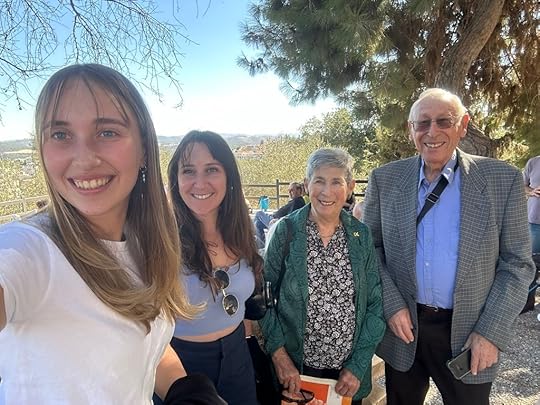
These are dark days for Israel despite the general sense of necessity regarding the battle against Hamas, Hezbollah and the various other proxies armed and financed by Iran. We hear constantly of the loss of precious lives as a result of the fighting in Gaza and Lebanon, and almost daily funerals of soldiers. Every day parts of Israel are subjected to barrages of rockets and weaponized drones aimed at killing and maiming the civilian population, forcing residents in those areas to take refuge in bomb shelters and safe rooms. For over a year hundreds of thousands of Israelis have been forced to live in cramped conditions far from home. Worst of all, one hundred and one hostages seized by Hamas on 7th October 2023 are still held in Gaza, whether alive or dead, in conditions of unimaginable horror.
And yet, life in other parts of Israel, including the Jerusalem region where I live, continues more or less as normal, though always under the shadow of events elsewhere in the country. We look out of the window and see the sun shining in the blue sky, the trees and flowers continuing to delight us, and the mountains in the distance instilling us with a sense of continuity.
Music has always played an important part in my life, starting in my childhood in London, when my parents gave me records of ‘Teddy Bears’ Picnic’ and ‘Sparky’s Magoc Piano’ as birthday presents, played me records of Mahler’s first symphony and ‘Peter and the Wolf,’ and even took me at an early age to the annual performance of Handel’s ‘Messiah.’ The impact of those performances has remained imprinted in my mind, and I have tried to pass on my love of music, first to my children and now to my grandchildren.
For several years the traditional performance of Handel’s monumental oratorio ‘Messiah’ in the Church of Our Lady of the Ark of the Covenant in the nearby Arab village of Abu Ghosh has been in abeyance due to the extensive renovation work on the church conducted under the auspices of the Vatican. Suddenly this year, in the midst of the war and tragedy that has befallen us, there was a beam of light. The Israel Barrocada Ensemble, which plays on period instruments and has been giving concerts in Tel Aviv, announced that it was returning to Abu Ghosh, and would start with a performance of Handel’s ‘Messiah.’ The sublime music, using texts taken from Isaiah, Psalms and other books of the Bible, has always inspired me and uplifted my spirit.
Our joy and excitement knew no bounds, and without delay we were online from France to order tickets for that event, inviting our two eldest granddaughters to join us. They have been to performances of the oratorio in the past, and were happy to join us once again. By the time we managed to get on to the site for ordering tickets the church was almost full, but four seats were still left in the front row, which we seized eagerly.
The day of the performance dawned with beautiful autumn weather, enabling us to enjoy the pastoral surroundings of the church and the panoramic view of the Judean Hills together with other members of the audience before the concert began. The thrill of being back in the renovated church with its wonderful acoustics was shared by all those who attended the concert, and the performance, with outstanding soloists and the orchestra conducted by the Estonian musician and staunch friend of Israel, Andres Mustonen, gave us almost two hours of unmitigated enjoyment, inspiration and bliss.
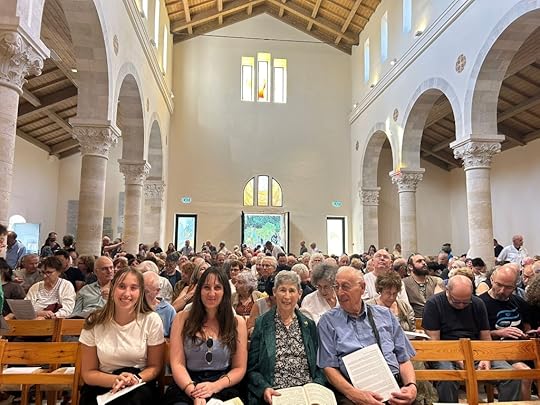
In these troubled times we can hardly believe how fortunate we are to be able to enjoy excellent music so close to home, and to share that enjoyment with the next generation. In these dark days we are eternally grateful to George Frederick Handel, to the Israel Barrocada Ensemble, to the excellent Shahar Choir and to Andres Mustonen for bringing us the gift of music and balm for our soul.
October 11, 2024
Living on Two Levels
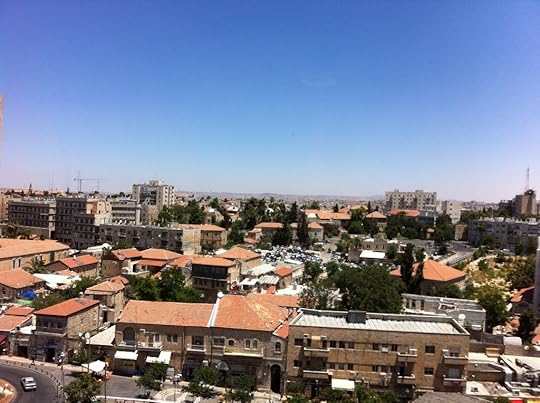
When I ordered the book entitled ‘Love in the Blitz: The Long-Lost Letters of a Brilliant Young Woman to her Beloved on the Front’ by Eileen Alexander I was not aware of its relevance to my current life. As I read, marvelling at the writer’s literary talent, sense of humour and ability to cope with the course her life was taking, I was not aware of the parallels to my situation. However, as Israel’s war with Hamas in Gaza and Hezbollah in Lebanon continues, with the possibility of its further extension to Iran, I am reminded more and more frequently of the Blitz, when Nazi Germany bombed England. The resilience and spirit of resistance of the Londoners at the time is a legend in our own time, serving as a model for us here in Israel as rockets rain down upon us from the north and the south, supplemented by ballistic missiles from Iran. Only the defence and interception systems of Israel and its allies preserve us from the wholesale death and destruction our enemies seek to inflict on us.
As I read Eileen Alexander’s letters I was struck by the way she managed to continue with her daily ablutions as well as her social life of luncheon engagements at restaurants,, tea parties at home and attending the theatre of an evening, keeping up with her wide circle of friends, acquaintances and relatives.
But over the course of the last year I have found myself in a somewhat similar situation, albeit with less intensity than the bombing of London in WWII. I live just outside Jerusalem, and this central part of Israel has been less subjected to rockets fired by Hamas and Hezbollah, though the missiles from Iran have been directed here. The bottom line is that we have not had to go to our bomb shelter as often as our compatriots in the north and south of the country.
As a result, we have developed a schizophrenic way of life here. It is late summer, with blue skies, gentle sunshine and moderate temperatures, the most idyllic climate that anywhere has to offer. King David knew what he was doing when he designated Jerusalem as his capital. The parks and gardens are still blooming, and although we know that the weather will get cooler and the rain will begin in a week or two, in the meantime we can go on with our lives in its usual pleasant way, going for walks, seeing friends and family members, going shopping, meeting a friend for coffee or eating in a restaurant. Shops are open, children go to school and it seems as if life is continuing as usual. Until, that is, one or another of our enemies decides that it’s time to send bombs, rockets or missiles in this direction.
But all the time, alongside our relatively pleasant way of life, our compatriots in the north and south of the country, are subjected to an almost incessant barrage of rockets, with constant sirens and alarms, causing them to seek shelter in one or another of the safe rooms or bomb shelters with which almost every town and village in Israel is equipped. The whole country is aware of the alerts on the radio and TV, and we know that while we are enjoying our usual calm routine other denizens of Israel are not. Our minds are beset by concern for our compatriots, who may also be friends and relatives in those parts of the country, and our social networks are busy with constant requests for information regarding their welfare.
Thus, as we are live a surreal existence of apparent normality and constant concern for others, we are also beset by uncertainty as to what lies ahead for us.
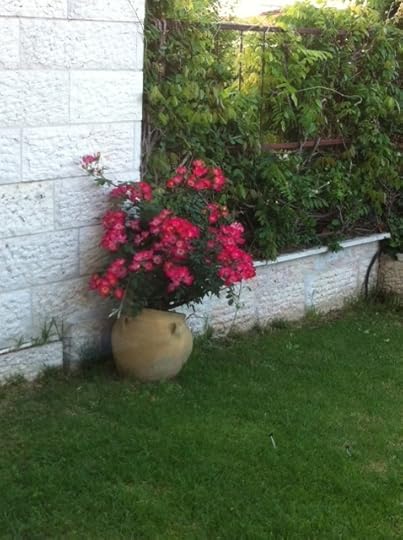
October 6, 2024
Sitting, Not Cowering
 SAMSUNG
SAMSUNGEvents come thick and fast in this part of the world, and the past week has provided the various media outlets with more material than they seem able to cope with. Thus, in the wake of the IDF’s incursion into Lebanon, accompanied by its advice to residents there to leave in order to avoid civilian casualties, the far-from-objective Sky News correspondent bewailed the exodus of the population there after having ignored the similar fate suffered by tens of thousands of Israelis in the north of Israel for the past year. Needless to say, that news channel failed to mention the tunnels and weapons stashes discovered in Lebanese villages, providing physical evidence of Hezbollah’s plans to attack Israelis along the lines of the Hamas assault of 7th October 2023.
The alarm that sounded in my phone as we were watching the evening news programme a few nights ago came from the IDF and was accompanied by a message telling us to take ourselves to the nearest shelter. Luckily, our home has a basement within which a bomb shelter with reinforced walls was incorporated at the construction stage, in accordance with the building regulations in force at the time.
Accordingly, my OH and I went downstairs, making sure the doors, windows and shutters in the house were closed, and were able to listen to the news on the TV set in the basement (which is also my private gym). We sat side-by-side in the shelter, waiting to be told that it was safe to leave. This took almost an hour, during which time we were able to hear the distant thud made as rockets were intercepted by our Iron Dome defence system.
The next day, when the various TV news channels reported the event (over 180 ballistic missiles fired towards Israel from Iran and intercepted by Israel), it was clear that they were impressed by Israel’s ability to defend itself, but the Sky reporter could not help herself and described Israel’s residents as ‘cowering in their bomb shelters.’ Well, madam, I have news for you. We were sitting, not cowering. And so, I believe, were most of our compatriots throughout the land.
Naturally, parents of young children have a more difficult job and have to deal with the various moods, reactions, fears and nerves that a child will display. But cowering is not part of the response that Israeli parents will be displaying to their offspring. Distracting their attention, playing with them and doing what they can to soothe unsettled minds and nerves are rather what parents should have been doing, and to the best of my knowledge that is what they did.
. Hezbollah’s attacks by means of rockets, drones and artillery began immediately after the Hamas assault in southern Israel a year ago. Civilians, including women and children, were killed and injured, and many thousands of Israelis had to leave their homes. Ever since then the bombardment has continued, causing destruction and devastation to the towns and villages of northern Israel. Families have been living as refugees in crowded conditions in other parts of Israel. The suffering is acute and ongoing, but not as photogenic as the vehicles standing bumper-to-bumper on the roads leading out of southern Lebanon.
When the dire situation of so many Israeli families first became apparent, two enterprising young women, Daniella Koffler, who happens to be my daughter-in-law, and Talya Tomer, wrote and illustrated a booklet aimed at helping children forced to leave their homes to understand and cope with the situation. The booklet, entitled ‘A Family Without a Home,’ was distributed free to as many displaced children as could be located, with the aid of the voluntary agencies set up to alleviate their plight. It can be purchased from https://morning-sale.page/miluimbook
It is now over six months since the booklet was published, The demand for it was so great that it is now out of print. The authors have received a great deal of positive feedback, and the booklet has been able to help many children – and their families – come to terms with the situation. Whether anyone believed that the crisis would last as long as it has – it is now a year since the assault by Hamas and Hezbollah’s supporting bombardment – is open to question. Maybe it’s time to produce a new booklet for children in bomb shelters.
September 26, 2024
It’s All Connected
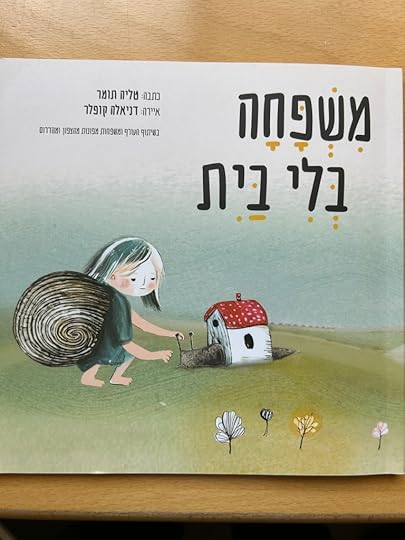
Most mornings, after I’ve had a cup of coffee and a chocolate Hobnob as I read the paper, I descend to our basement, where a treadmill and exercise bike along with other exercise apparatus await me. As I exercise for about an hour I watch the news on TV, from stations such as Sky, CNN, Fox and Bloomberg, so that I’m up-to-date with what’s happening in the world and not focused solely on the news from Israel.
Just now all the news channels are focusing on what’s happening in Lebanon. The British government has urged all British citizens in Lebanon to leave immediately and is even sending troops to Cyprus to help with their evacuation. The screen is full of scenes of cars, trucks and other vehicles stuck bumper to bumper and packed to the brim with families fleeing southern Lebanon to get away from the region being bombarded by Israel. As is the case in Gaza, the UN is concerned about the fate of the children. Funnily enough, the UN showed little concern for the fate of Israeli children and there was no similar call to British citizens living in Israel after the attacks on the country launched by Hamas in the south and Hezbollah in the north last October.
Even stranger is the fact that scarcely any mention is made of the reason for Israel’s bombardment of Lebanon – the location in private houses of rockets and other weapons by Hezbollah. That terrorist organization has succeeded in establishing itself throughout southern Lebanon, from where it has been firing persistently on northern Israel. Since the assault on homes and civilians in the south of Israel by Hamas terrorists on 7th October 2023 Hezbollah has intensified its attacks on homes and civilians in the north of Israel. Those attacks by rockets, drones and artillery that began immediately after the Hamas attack in southern Israel killed and injured civilians, including children, and forced many thousands of Israelis to leave their homes. Ever since that date the bombardment by Hezbollah has continued, causing destruction and devastation to the towns and villages in northern Israel.
That situation has prevailed for the past year, so that entire Israeli communities have been displaced, with families living as refugees in crowded conditions in other parts of Israel. The suffering is acute and ongoing, but not as photogenic as the vehicles standing bumper-to-bumper on roads leading out of southern Lebanon.
When the dire situation of so many Israeli families first became apparent, two enterprising young women (one of whom happens to be my daughter-in-law) wrote and illustrated a booklet aimed at helping children forced to leave their homes to understand and cope with the situation. The booklet, entitled ‘A Family Without a Home,’ was distributed free to as many displaced children as could be located, with the aid of the voluntary agencies set up to alleviate their plight.
It is now over six months since the booklet was published, The demand for it was so great that it is now out of print. The authors have received a great deal of positive feedback, and the booklet has been able to help many children – and their families – come to terms with the situation. Whether anyone believed that the situation would last as long as it has – it is now almost a year since the assault by Hamas – is open to question. It is up to the military and the politicians who manage these matters to decide how and when all this will come to an end. We can only hope and pray that it is soon.
September 18, 2024
Excellent Service
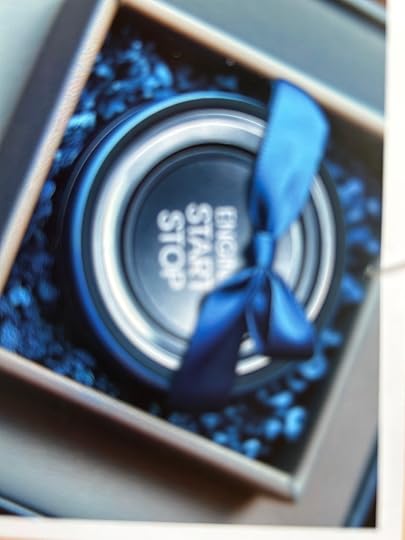
Like so many other ideas, it seemed clever at the time. We were due to be away from Israel for a little more than a month, the car we had driven for the past two years was beginning to show signs of wear and tear, mainly due to my own imperfect skill at parking, and the opportunity arose to acquire a new car from the same company by doing what’s known as a ‘trade-in,’ whereby the price difference between the two vehicles is paid in installments.
The company concerned (which shall remain anonymous so that I can’t be accused of libel) was only too happy to oblige. We are veteran customers, and are generally happy with the vehicles we buy from them. The choices we were offered varied between a sleek, modern version of our previous car and a rather ordinary-looking vehicle with the kinds of bells and whistles that appeal to the gadget-loving male of the species. My OH’s preference was for the latter, and so that was the one we got.
Before leaving on holiday we handed in our current car and were told that the ship bringing the fresh batch of vehicles would be reaching Israel in our absence, the procedure for registering the change in ownership would be undertaken by the company, and for that purpose we were told to leave our ID cards there. This we did willingly, glad to be relieved of at least one bureaucratic headache.
While we were away on vacation we received regular updates as to the location and progress of our new car, and sure enough, later on the same day that our plane landed in Israel at 5 a.m. we were able to take a taxi to the sales office and collect the shining new car. The company representative sat with us for half an hour and ran through all the features and facets of the vehicle, which is as sophisticated and computerized as they come. My OH is far more technically-minded than I am, and so I relied on him to be able to absorb and remember all the new information with which we were bombarded.
After a few minutes of anxiety and confusion, occasioning a repeat of the information by the unfortunate company representative, we managed to maneouvre out of the car park and make our way home in our magnificent new vehicle. Minor irritants such as how to get the radio or air-conditioning to work were eventually overcome, and we began to feel comfortable with the new car. Inside it was a card welcoming us and giving us a number to call any time, day or night, should we need help of any kind.
After asking for our ID cards we were told that they could not be found in the company’s sales office, or in any of the other offices around Israel. We were sent a form acknowledging what had happened, which we were able to show to the Ministry of the Interior when we went there to request new ID cards. We went to the Ministry of the Interior’s office, waited in the queue and were eventually seen by one of the officials, who did not seem at all surprised upon hearing what had happened. Hopefully our new ID cards will arrive by registered post some time soon.
On the way home from the Ministry we encountered a new problem with the radio, and so we called the number on the card promising to provide help at any time. It took a long time for them to pick up, and when a young lady finally answered she asked us first for our registration number (which we didn’t remember) then for a photo of our dashboard. How is one supposed to take a photo of one’s dashboard while driving? And why didn’t she know what kind of dashboard this particular car had? After all, what was she doing there? We stopped the call as we had managed to reach home, and eventually solved the problem ourselves.
The next day a beautiful orchid was delivered to our house, together with a card from the company, once again promising to provide assistance at any time, anywhere.
I don’t think I’ll be calling them any time soon.
September 11, 2024
Home Sweet Home
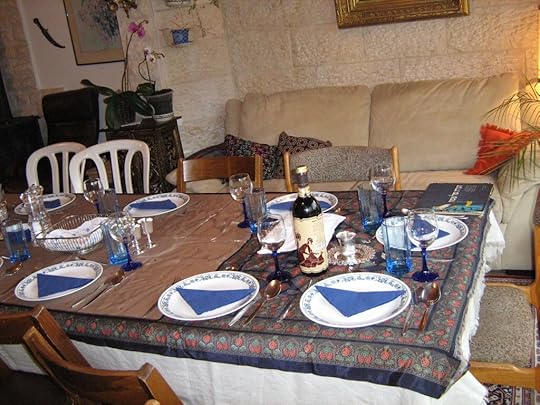
Life in Israel is anything but sweet at the moment, with a difficult political situation, war in Gaza, over one hundred hostages still being held by Hamas and the heat of high summer. And yet, coming back to our home after being away for over a month was sweet and enjoyable.
Our two-day journey to Marseille from central France was long and arduous, despite being broken by an overnight stay in Lyon and an enjoyable family visit there. The burden of driving fell entirely on my OH, and despite the good roads and fairly frequent pit stops for rest and food it was a strain on our minds and bodies, which are not as young and agile as they once were. The night flight back was relatively short, but provided little opportunity to rest because of the presence nearby of a courageous young mother with her four children.
It was comforting to find our house clean and in good condition, and as dawn broke we were able to enjoy the sight of the sun rising over the Judaean hills, and relish the bright Mediterranean light. We were able to collect our new car from the agency and go to our favourite restaurant in nearby Abu Ghosh for lunch. As we parked one of the waiters came to greet us and congratulated us on our new car. We are customers there of long standing, it’s true, but to be able to recognize which car we drive is quite a feat. After all, hundreds of people eat there every week. The other waiters came out to join him, and a lively discussion about the pros and cons of the various cars followed. The whole experience (as well as the enjoyable meal) gave us the feeling of being welcomed and happy to be home again.
As the weekend approaches we look forward to meeting up with our children and grandchildren once more, and have already spoken to most of them on the phone. The resumption of our traditional Friday night family meal is one of the highlights of our week, giving us an opportunity to catch up on the lives of our nearest and dearest and also to share with them our experiences of our time abroad.
Music plays an important role in our life, whether in Israel or abroad, but it is always a special pleasure to be able once again to turn on the radio at almost any time of the day or night and hear good music introduced by Hebrew-speaking announcers. Naturally, the radio announcements on the music programme in France speak in French which, despite our best efforts, we can’t always understand. In addition, many of those programmes involve lengthy discussions or erudite analyses (always in French), which cut short the actual time devoted to music. Besides this, every day there is a two-hour slot, between six and eight in the evening, devoted to jazz, which is not quite our taste. We try to time our evening stroll for that period, but it doesn’t always work out, and we certainly can’t keep walking for two hours.
And so, despite the joys of life in France, there’s no escaping the banal truth that there’s no place like home.
September 2, 2024
The Potato Festival
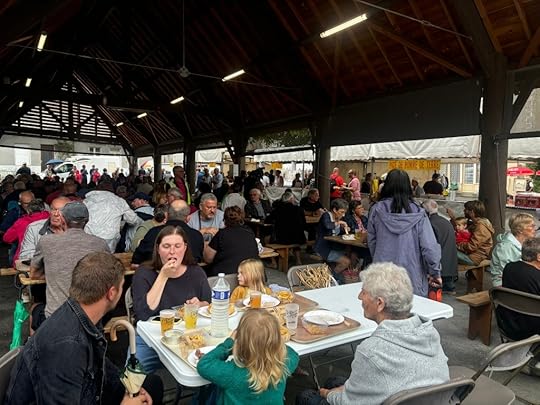
After summing up our stay in France, I was told by a neighbour in the village that we simply mustn’t miss the annual potato festival in one of the nearby villages. There was the added enticement of a brocante and so, since the sky was overcast rain, we put our rain jackets on, hoped for the best and ventured out to join the fun.
What we found looked at first like just another market day in the village, with stalls selling vegetables and fruit of all kinds, generally sold by the farmers who grew them. In addition, there were stalls selling all kinds of cheeses as well as some chickens roasting on a rotating spit. But eventually we came to the central area, where benches and tablesunder an enormous tent awaited the visitors who would eat the fare on offer.
We continued on down the road through the village, where stalls offered the usual brocante fare of sundry goods, assorted junk and anything anyone wantd to sell or get rid of at a reduced price. At lunch time the stalls surrounding the main tent came to life, some offering chips, others sausages, and yet others various forms of cooked potatoes (mashed, baked, fondu, to name but a few). We stood in line for the chips and sausages stall (Merguez sausages are made without pork, and they were the only ones on sale), and noticed that the people around us were holding blue plastic coins. It turned out that in order to obtain them, the only means of payment, one had to go to a central cash desk and buy the blue plastic objects. Another queue, then back to the initial one. The kind person in front of us in the first queue let us back in, which did not seem to bother the other people in the queue. I’m not sure that would have happened in Israel, but the local villagers tend to be easy-going and kind.
Eventually our turn came, we were served two rather burnt sausages as well as a container of chips. As well as dispensers with mustard and ketchup, there were small brown-paper packages on the counter containing sets of disposable cutlery (not plastic), and with our tray of food we went in search of a place to sit down. All the hundreds of places seemed to be occupied, and the only available table and bench were at the edge of the tent, meaning that the rain that had begun to fall would land on us. Still, we had our rain jackets, so had some protection from the rain, which thankfully was light.
To get something to drink with our food would have meant standing in two more queues, but by chance Yigal espied the village’s corner grocery store, so was able to buy a bottle of water there. We managed to consume our food without getting too wet, and then set off to return to our car and make our way along the long and winding road (had the Beatles ever visited this part of France?) to our home. The culinary experience was not very inspiring, but it was good once more to see how the locals live and manage to enjoy life.
August 26, 2024
A Summing Up
Although we spent more than a month in the French countryside, our phones were connected to the internet and we received frequent updates about events and developments in Israel, so that we did not feel cxoompletely cut off from our homeland. In consequence, we were constantly torn between concern for our friends and family at home and the calm atmosphere surrounding us, with the tranquil village houses, green fields, hedges and trees, and occasional visits to and from friends and neighbours. Even neighbours we hardly knew made a point of asking how we and our family were feeling and coping with the situation. We found all this concern and fellow-feeling very touching.
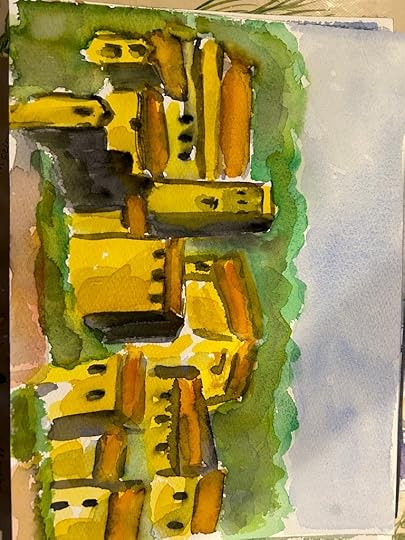
Our time in France was spent mainly in pursuing our hobbies and interests, enjoying the opportunity to walk in the clean country air, visit village ‘brocantes,’ where people set up stalls and bring out all manner of objects theey want to get rid of in return for a few euros. The range and variety of objects available never ceases to amazt me, reaching from all manner of toys and clothes to jewellery, crockery, plants, paintings, gadgets, knick-knacks and furniture. The atmosphere is friendly and it is quite acceptable to haggle a little over the asking price. We managed to pick up one or two little objects as well as some plants for the pots that have been standing empty outside our house in the village for a couple of years.
Despite the mournful character of our home thoughts from abroad, it’s impossible not to be positively affected by the beautiful and peaceful surroundings and the general atmosphere of relaxed harmony that seems to pervade everyone and everything in this part of France. The other drivers on the roads are generally courteous and considerate, and it is very rare to hear anyone using their horn. Tractors and trucks with trailers bearing agricultural equipment are not an uncommon sight on the narrow country roads (though not on the autoroutes), and one has to be on one’s guard for their occasional iinterruption of the smooth flow of traffic. Now that Yigal and I are both over eighty we try to restrict our driving and stick to less arduous journeys, but sometimes it’s inevitable, and we try to enjoy the scenery as we go while maintaining the speed limit and adhering to the highway code,
Being away from home has enabled us to engage in activities which are not part of our usual routine. Thus, I have been able to sit down after breakfast (and after doing my exercise routine and practicing piano on our Clavinova synthesizer) and try to do some painting rather than resuming my writing project, as I do at home. Yigal prepared a lecture about art and mythology in ancient Egypt and gave a talk to a group of friends, both old and new, who came to our house to hear him. They were all very appreciative of his effort, and we even received several thankyou letters (emails). Other than that we have both been able to practise using the Frrench language in various contexts, whether in shops, with neighbours, listening to the radio or reading the French newspaper ‘Le Figaro,’ whose weekend edition is replete with coloured supplements covering a wide range of articles, the current one having extensive coverage of the actor Alain Delon, who recently passed away.
We do not have a TV set in France, and our limited comprehension of the rare news broascasts on the music programme on the radio (France Musique) means that we are quite cut off from the news in the wider world, although brief internet news bulletins do reach us on a daily basis. On the one hand, it’s good for our mental health not to be bombarded by news broadcasts, interviews and discussions on TV, as we are when we’re in Israel, but it is not good to feel more or less detached from what’s happening in Israel.
Apart from enjoying the peace and quiet, there is the added pleasure of being able to go to one of the nearby villages or towns and eat at a local restaurant. If one sticks to the ‘plat du jour’ or even ‘menu du jour’ (daily set menu) one can enjoy a decent three-course lunch at a reasonable price. If the set menu doesn’t appeal to us, there is usually an alternative dish on offer. Sometimes we have to make use of Google Translate in order to decipher the menu, but we generally manage to find something to our taste. Besides all this, there is the added pleasure of shopping and cooking in France, and it is indeed a pleasure to pass along the supermarket aisles with their arraysS of cheeses, chocolates and other goodies. We’ve made a habit of occasionally buying a pre-roasted chicken (fresh every morning at the meat section of the supermarket) and building our meal around that. By adding a packet of frozen vegetables already peeled and cut for ratatouille we are saved hours of preparation. Strawberries are still available for dessert as well as cantaloupe melon, with the added joy of a ready-made Rum Baba for afternoon tea.
The ex-pat community in these parts seems to be constantly growing, and our little village is now home to several other Brits. Our neighbour hails from Australia, his girlfriend from the USA, and a Canadian has recently moved in just down the road. Most of our friends in the region are originally from English-speaking countries, and we tend to meet up for lunches or coffee in a local restaurant or someone’s home.
Our summer adventure started back in June, with our trip to visit friends (and the stunning Kroller-Muller Museum) in Holland, followed by a foray to Germany, where we visited Potsdam and attended the Bach festival in Leipzig, with the additional bonus of meeting up with an old friend from England. After that we were able to spend a couple of weeks in France before returning to Israel to catch up with friends and family there before departing once more for France. This time we flew to Marseilles, making a brief visit to a beloved cousin there before embarking on the long drive up through France to ‘our’ village. This stay has also had its highlights, with our inclusion in the first Gouzon Bookfest and attendance at a lunch with many of our friends in this part of France.
And so, as we come to the end of our time away from home, we look forward to returning to our usual haunts, the unique atmosphere provided by Israel, its scenery and population, as well as its political problems and often worrying security situation. Still, we keep hoping that those issues will be settled in the near future, a peace settlement achieved and the hostages released. And while the temperature in France is growing cooler, I know that Israel remains hot and sunny, and I’m definitely looking forward to that.



